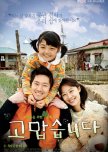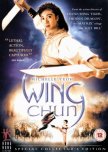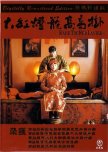
This review may contain spoilers
An old school drama that dealt with AIDS, dementia, redemption, and single parenthood in a thoughtful and compelling manner.I loved how this drama did not back away from confronting the stigma HIV/AIDS patients face, especially nearly two decades ago. Once the little girl's situation was brought out into the open, the drama used each episode as a teachable moment not just for the characters, but the audience as well. The scope of her disease was narrowed down for drama purposes but I'm glad they showed how people afflicted with AIDS need support and not ostracization.
Seo Shin Ae, as little Bom, won my heart with her performance. She moved from tears, to laughter, to precocious behavior seamlessly. She was a joy to watch.
Jang Hyuk gave a stellar performance as the closed off doctor who found redemption and peace on a small island. A family of misfits washed him as clean as the shore after the waves recede-a single mother, a daughter with AIDS, and a father with dementia in a remote community was not where this ill tempered doctor ever thought he would wind up. Throughout the drama Jang Hyuk allowed us to feel Min Ki Seo's contempt, his sorrow, his compassion, and his reluctant love developing.
The drawback for me was Gong Hyo Jin's performance. Most of the characters grew and changed, all except her Lee Young Shin. Hyo Jin excels at playing self-sacrificing doormats, but aside from a few smiles with Bom, her performance was rather one note. The writers were at fault as well, they never fully developed this matriarch of misfits. Up until the very end of this drama, I never understood her, never saw a glimmer of affection for the man they told us she was falling in love with. Her mumbling, stumbling, head down performance and frozen expression took away from the emotional depth of this drama. It was hard to hope for a relationship to develop between Min Ki Seo and this woman who could not crack her heart open long enough to share a part of herself with him.
I enjoyed this drama overall and would have loved it more if the writers and actress had let us watch Lee Young Shin grow and blossom, learn to stand up for herself and her daughter, and bask in the love of the imperfect but dedicated man who fought to stand beside her. As it was, I found Min's and Bom's First Guardian Angel and Angel friendship much more heartwarming and engaging.
Was this review helpful to you?

Michelle Yeoh was amazing as the young woman, Wing Chun, who had escaped a forced marriage and gone to study martial arts for years. Upon returning home and setting up a tofu shop she was often the wall between the townspeople and roving bandits. Michelle did nearly all of her own stunt work and truly shone brightly in this role.
Donnie Yen played Leung Pok To, Wing Chun’s childhood friend, who had returned after several years away to ask for her hand in marriage. He didn’t recognize her as she was dressed as a man and mistakenly thought the pretty young widow who worked in Wing’s tofu shop was her. Suitors competed for the women and there was some good-natured bed hopping. There was a love triangle, or maybe square, on second thought it might have been a love heptagon.
Donnie was as cute as a puppy in his role as Wing Chun’s would-be suitor. Leung was skilled in martial arts but not as accomplished as his childhood love. Norman Chu seemed to have a good time playing the Bandit King, he made a brash and comical villain. He couldn’t decide if he wanted to beat Wing Chun or marry her. The side characters were interesting and distinguishable--the money counting and intimidating sister who had eyes on a scholar, the scholar who was torn between Wing Chun and the young widow, the young widow who was in need of a man’s, uh, services, and a bandit who wanted the widow as his wife--all helped fill out the story in a meaningful way.
I liked this movie because unlike a lot of kung fu movies the romances weren’t tacked on and were relevant to the plot. These were all people trying to earn their happily ever afters in between kung fu fights, of course.
Yuen Woo Ping outdid himself with the creative fights, one particularly clever fight between Wing Chun, a hired fighter, and a plate of tofu was ingenious. There were no deaths or blood-soaked bodies, just lots of high wire, good old-fashioned fights with people who knew what they were doing. The action was fast, stunningly choreographed, and well-acted at the same time. Though some parts of the fights were unrealistic, who cares when they were so entertaining.
Importantly, they stuck the landing. I loved the final fight between Wing Chun and the Bandit King. I’ve never seen fight scenes quite like the ones shot for this film. The culmination of it was perfect. They also made me laugh. This film made me laugh several times and I rarely if ever laugh at “funny” kung fu movies. This was not a perfect film and some parts of it were dated. Regardless of its flaws, I enjoyed it.
Michelle and Donnie are two of my favorite actors and this film was a dream team for me complete with romance and spectacular fights. If you enjoy kung fu movies, this one is well worth seeking out.
Was this review helpful to you?

Xuan Zang set out for India, when it was forbidden to leave the country, in order to bring copies of more accurate Buddhist scriptures home. Reason, laws, and the threat of death could not deter him from his holy quest.
The cinematography was extraordinary and a treat for the eyes as Xuan traveled through both cities and desert wilderness, often alone. Varying from lush green to desolate sand and stone, and later snow capped mountains, the scenery was breath-taking. Ancient ruins, temples, and shrines are visited. Often the scenery showed him barely visible, a tiny monk making his way through a vast and sacred world. The music fit with the mood perfectly.
This is a slow, reflective film as Xuan's faith meets up against disappointment and hardship. Living in a time when I can find information with the push of a button, I'm in awe of someone who was willing to risk death, imprisonment, starvation, and thirst to increase his knowledge and faith and then the overwhelming desire to bring it back home again to share. His journey took between 16 and 19 years depending on the source and he covered over 25,000 km (15,534 miles). This film gives a glimpse of what he accomplished, the people he met, the effect he had on others, and the joy the scriptures brought to him. There are a couple of narrative hiccoughs when an inexplicable time and place jump occur, but that's a rarity, and a small quibble. The censor's heavy hand causes a few shadows as well. For the most part this is a film to soothe the eyes, ears, and soul. Every moment and person is treated as holy and a gift. It may be the idealized version of his life but it was a pleasure to sink into it and let the beauty of the colors and notes and love for all life wash over me.
Was this review helpful to you?

Lena is a descendent of Koreans who were forced to work for the Japanese mining coal in Sakhalin and then later trapped there after WWII. Their story would make an interesting film in and off itself as they fought for citizenship and many fought to go back to South Korea. They became second class citizens in Russia and those who made it home were less than in South Korea as well. Lena wants to bury her parents' ashes in South Korea and becomes a mail order bride to make the trip. This aspect is barely touched on and again, would have given more depth to the story to explore that process.
The male lead is a tea farmer in a remote area which lends itself to some lovely cinematography. He tries very hard to make Lena feel welcome and give her anything she needs. Lena in turn tries to help with different chores to show that she is invested in the relationship. She calls him ahjussi throughout the movie which seems to make their relationship an even further oddity. As she walks to the fields she makes friends with a photographer who is traveling through and begins learning to take photographs. Both the film's cinematography and her photos play a large role. Lena tends to be quiet, walking and taking pictures as she has much on her mind. I wish we'd been more privy to what was weighing so heavily on her.
The last thirty minutes or so give the movie the emotional thrust it sorely needed. While this was a beautiful, quiet movie, it could have been more meaningful if only the director had stirred the calm surface with the emotions running beneath.
Was this review helpful to you?

The movie starts with miners being violently killed in a dark, flooded cave. It is creepy and claustrophobic. Up out of the ground come giant killer dragonfly larvae. Much of the first part of the film is people hunting them down and attempting to kill them. Little did they know that what eats the giant insects was going to be more problematic-like letting a tiger in the back door to chase the wolves away at the front door.
Rodan was much more impressive in this movie than subsequent ones. He was huge, mobile, and destructive. Yes, you can see the wires at times if you look closely, but this old movie did quite a bit with the special effects and budget they had available to them. The miniatures were exquisite. Honda Ishiro and Ifukube Akira did a good job of bringing a giant flying dinosaur to life and making us care about him when by all rights we shouldn't.
Many times the human aspect of these movies fails. This time there was a sense of urgency and pathos from the beginning to the end. It also helped that this movie came before subsequent campy monster romps. As with Godzilla, by the end of the movie, even the human characters begin to feel sympathy for the great beasts.
Though around 65 years old I thought Rodan held up pretty well. He's now in my top three early Toho movies.
Was this review helpful to you?

For me there were too many characters and too many conflicts to fully connect with many of the characters. I enjoyed it but I didn't love it and likely would not visit this group of dysfunctional people again. Bittersweet and heart-warming at the same time, Big Little Women at least gave us a largely female cast and shined a light on the complicated female relationships and strengths within a family.
Was this review helpful to you?

This review may contain spoilers
This is my first Filipino movie and I really enjoyed it. It's the story of a family that drifted apart after the mother died years ago.The story begins with the father of four grown children spending his birthday alone because his children are too focused on their own lives and problems to visit. On the day of his unattended party his receives news that he has cancer and only 7 weeks to live. He sends a text to his children to inform them of the news.
The eldest son took over the family store and is on the verge of bankruptcy. The second son became wealthy and successful but believes his family only likes him for his money. The daughter has three children with a philandering husband. The youngest child felt abandoned after the mother died and his siblings moved away and is now in legal trouble.
The children decide to come together on a Sunday and throw him a surprise birthday party, but old wounds flare up and arguments explode. After learning of their father's distress over their squabbles, the children agree to get along for his sake and to meet every Sunday at his house. Each Sunday the family comes together on various adventures and learn about each other in the process.
There are ups and downs in the story as wounds and secrets are revealed and healed.
I don't want to spoil the secrets, but I will say that this is not a downer or tragedy. This movie is the definition of heart-warming.
I can recommend this movie with a happy heart.
Was this review helpful to you?

This review may contain spoilers
It's not very often a martial arts movie comes out with strong fight scenes and even stronger acting. Brotherhood of the Blades boasted a quietly competent cast who elevated this movie above standard wuxia fare. Three Imperial Assassins and sworn brothers, though skilled with their swords had to face down death and deception from various factions. The always troublesome eunuch (this time after he was deposed) who shows up in numerous martial arts movies, once again instigated double-crossing schemes, this time imperiling the three loyal assassins.
Chang Chen led the three sworn brothers. His character, Shen Lian, though loyal to his brothers and emperor, was morally ambiguous. Willing to do whatever the situation called for, he set into motion a sword that would hang over all three of the assassins' heads.
The three hearty friends all harbored a need for money. Shen Lian wished to free a courtesan but lacked the power and money to do so. Wang Qian Yuan, as Lu Jian Xing, longed for promotion, only lacking the amount of money needed for bribing officials. Li Dong Xue as Jin Yi Chuan, the third assassin and the youngest, loved a doctor's daughter and had secrets of his own. The eunuch's waning power and wealth still proved perilous and tempting. The loyal allies had no safe quarter with the emperor and his officials. Blades aimed at them from nearly every quarter, even longtime allies proved treacherous.
The fight choreography was quite good, less reliant on wires and Olympic level gymnastics. The fights were fast, brutal, and bloody. They stretched reality in a few scenes, but so do most action movies. If I have one quibble, it's that the action scenes went on too long and were overused. As the story felt thin, perhaps it distracted from the lack of a more complex plot and character development.
The cinematography though dark and dreary fit the mood of the film. Often monochromatic, the shots worked perfectly for the bloody fight scenes. The costumes and sets were well done, befitting the time period. Brotherhood of Blades was stunning to watch without being overdone.
Chang Chen gave a mesmerizing performance, filling in gaps the script lacked. The supporting actors were all strong even though many of their characters were thinly drawn.
Brotherhood of the Blades battered away at the characters through intrigue and loss. Dark and intense, this film balanced its three main characters on the edge of a knife in the midst of hungry wolves. And set this viewer on the edge of her seat wondering who, if any, of the Brotherhood would survive.
Was this review helpful to you?

This review may contain spoilers
"People are ghosts, and ghosts are people."
The cold stone complex with glowing red eyes in Zhang Yi Mou’s Raise the Red Lantern bids young women into its luxurious lifestyle. Afterall, it’s just as easy to marry a rich man as it is a poor man. Or is it?Gong Li stars as Songlian the newest concubine of a rich man in this gilded cage of competitive horrors. Educated but with few options after her father dies she marries an older man. She quickly learns that the women and servants are pitted against one another in a popularity game to garner the master’s favor. Red lanterns are lit in the courtyard and living apartment of the woman he chooses for the night. The clickety clack of massage hammers used on the chosen one’s feet turns into a Pavlov’s bell for the women. The master’s idea of foreplay is something akin to “brace yourself darlin’” but the women do what they must to attract his attention and keep it.
Other than the privileges the chosen one temporarily receives, the concubines hold no power. They are largely interchangeable, this is the territory of the powerful master and his game and rules. The women’s fate is tied to pleasing him and gifting him sons. In the ruthless conflict between the concubines, betrayal and tragedy are always near at hand.
Master Chen’s face is never focused on. His is the face of oppression and rigid familial customs, the ringmaster in the tragic circus.
Songlian discovers that the people in the huge complex are largely ghosts living in the house abiding by the rules of ancestors long gone. She tries to rebel, game the system, and in the end becomes ostracized and alone. When she witnesses an unspeakable act she realizes that she is trapped with only two ways out-death or madness.
Raise the Red Lantern criticizes a number of social structures as well as the plight of women during this time. Outdated cruel traditions that guide their everyday life are firmly in the director’s bullseye. It is gripping and difficult to watch at times.
Songlian is not an easy character to like as she can be very abrasive and snobbish. Her youth and independent nature cause her to chafe under the ridiculous rules and volatile hierarchy. She learns the hard way the price for disobedience. Gong Li’s expressive face helps us to understand how we should feel as well. Rebellious. Trapped. Isolated. Horrified. She gives a gloriously understated performance as a young woman caught in the chains of family customs; the players involved more like ghosts ensnaring fresh faces to drag into their macabre story.
Zhang Yi Mou saturates some scenes in a rich red light, the color of birth, life, and death. At other times an icy blue hue overtakes the scene driving home the solitariness of the one not chosen. The large complex could almost be given a credit as well the way Zhang lovingly uses the stunning architecture to showcase the concubines’ limited stone world. There was no soft place to land amongst the hard edges. The lush colors of their costumes played in stark contrast to the institutional banality. It was a remote facility both physically and emotionally.
The sets, concubines, and costumes are intoxicatingly beautiful but lying beneath them is a grotesque cruelty. Raise the Red Lantern is a treat for the eyes as most of Zhang Yi Mou’s films are. Though difficult to watch this story of the powerful’s abuse of women and tradition is one worth trying.
“What do people amount to in this house? They’re like dogs, cats, or rats, but certainly not people.”
1/12/23
Was this review helpful to you?

This review may contain spoilers
Even if you start at a disadvantage, you can still be first across the finish line
Zero to Hero is an inspiring biopic about twelve-time Paralympic medalist So Wa Wai. So was the first para-athlete from Hong Kong to win gold and still holds the record in the 200m sprint. Zero to Hero is a feel good movie that also doesn't shy away from it's characters' faults and harsh reality.So Wa Wai was born with haemolytic jaundice which resulted in cerebral palsy. His mother was told he would never walk or be able to hold chopsticks. And he would only be able to hear 10-20%. She carried him on her back, literally, until he was four. In a desperate life or death moment, the mother challenged him to walk. As he gained more ability, they learned he may not walk well, but he could run.
As a teenager he joined the para-athlete's association and trained to run in competitions. The way to his success did not always run smoothly. His family was poor and used desperately needed funds to help him achieve his success. The movie highlighted how difficult it was for Paralympic athletes to continue training and competing with few subsidies from the government.
The true heart of this movie was the mother-son relationship. Sandra Ng gave a beautiful performance as the resolute mother who refused to give up on her child and sacrificed greatly to ensure he became all he could be and that he would have a financially secure future after she was gone. This created conflict with Wa Wai as he worried she was using him at one point and with his younger brother who felt at times that his only role was to be Wa Wai's future caretaker. Though perhaps flawed, the strength of this mother's love and determination to gain the best for her son and for him to overcome his limitations shined through. "Run to me at the finish line."
Leung Chung Hang's performance never felt patronizing. He poignantly portrayed a child dependent on his mother who grew into a man with his own goals and need to help his family. Yet in the end, it was the love for his dedicated mother that gave him the strength to attain those goals.
Heartwarming and inspirational with enough realistic edge to keep it from being treacly, Zero to Hero is a winner.
Was this review helpful to you?

"This is personal" Well, of course it is...
Triple Threat had an embarrassment of martial artists riches and also embarrassingly bad dialogue, even for an action movie. The martial arts were also short shrifted in lieu of guns and things that go boom far too often.Payu and Long Fei have been hired to help with a “humanitarian” mission that turns out to be anything but. Local security for the site, Jaka, loses his wife in the deadly firefight that erupts when the mercenaries enter the village to release Collins, a notorious terrorist. Payu, Long Fei, and Jaka develop a tenuous partnership to bring down the mercs and end up protecting a Chinese heiress/local philanthropist along the way.
The firefights were often over the top as the bad guys mowed down people throughout the small country of Maha Jaya. Things were always more interesting when the guns were down and the fists and kicks were up. Tony Jaa, Iko Uwais, and Tiger Chen all have experience with fighting on screen and choreography. The weakest of the three was Tiger as his fights often looked slow and uninspired. Tony and Iko were far more entertaining as they defied gravity with their flexibility, quickness, and strength. Bad guy, Scott Adkins, was able to keep up with the kicks as was Michael Jai White. Jeeja Yanin had what amounted to a glorified guest role and didn’t have many chances to show her skills.
The action came fast and furious with the fighters and heiress on the run. Unfortunately, some of the acting and much of the dialogue was painfully cringeworthy. Not much effort was made to create a cohesive story either. As a check your brain at the door, let’s watch Tony Jaa fly and flip, it was rudimentary martial arts action entertainment.
15 May 2024
Was this review helpful to you?

"I had no regrets until I met you"
Happy Together was a haunting, gut-wrenching look at love and loneliness with stellar performances by the main cast. Tony Leung Chiu Wai and Leslie Cheung played an on again, off again couple who were often lonelier when they were together than when they were apart.Ho Po Wing and Lai Yiu Fai have traveled from Hong Kong to Argentina. On a trip to see the Iguazu Falls they become hopelessly lost and Ho breaks up with Lai and not for the first time. Lai finds work as a club doorman while Ho starts turning tricks to make a living. As Lai watches Ho with other men, a deep sorrow and homesickness overtakes him. He doesn’t want to inevitably “start over” as they usually do, he wants to go home to Hong Kong. He needs to make enough money first. When Ho is beaten by one of his clients, Lai lets him in and takes care of him, but refuses to sleep with him. At a new job, Lai makes friends with Chang, a young man from Taipei, which causes friction between the two lovers.
Ho and Lai were in a “can’t live with him, can’t live without him” dynamic. Ho had a reckless streak that Lai tried to tame, but would cause Ho to chafe at the constraints. Every scene was filled with raw emotions-longing, agony, passion, and despair. While Leslie Cheung gave a wonderful performance as the erratic Ho, it was Tony Leung who captivated me with his. I’ve seen Tony in numerous films, but this was the best performance of his I’ve seen so far. He has never had a problem with the too cool for school vibe, but in this film, he tore through emotions left and right without going over the top. It was impossible to not empathize with Lai when the heartache and misery were visibly eating away at him. In a scene where Ho taught him how to dance, the desire not just for this man, but also a longing for something more, something unattainable was quite moving.
A young Chang Chen as Chang Wan brought a breath of soothing air into Lai’s life. The friendship was easy and a reminder of home. Chang had a tender scene as he tucked a sorrowful, intoxicated Lai into bed. Their friendship was a lifeline for the floundering Lai. When Chang left Buenos Aires, Lai was truly adrift and found that “lonely people are all the same.” Lai became more convinced he did not want to ever “start again” with Ho, regardless of his deep feelings for him. Ho was like the prodigal son who had to occasionally self-destruct knowing that Lai would always be there for him in some capacity.
This film had Wong Kar Wai’s trademark palette of greens, yellows, and reds along with scenes in black and white. There is no denying his aesthetic gift, but sometimes I don’t connect with the story he’s telling. Happy Together connected everything for me. The plot was thin, almost non-existent, as these men struggled to make a living and struggled to alleviate their desire to return home and to somehow survive their complex disparities. I thoroughly enjoyed the varied music, which ranged from Tango Apasionado to fittingly enough, Happy Together originally by The Turtles. The songs flowed naturally through the film as stark emotions ebbed and rose.
Happy Together’s unflinching exploration of a tempestuous relationship was hard to watch at times, but impossible to look away from. Tony Leung peeled back his stunning façade and poured out an impressive array of emotions both nuanced and heartbreakingly real. Much like the Iguazu Falls, Ho and Lai’s bond was powerful, chaotic, captivating, murky, and completely unforgettable.
8 May 2024
Was this review helpful to you?

"Impossibilities are what make this world interesting"
The Sealer was a short drama involving a secret organization that seals blades filled with “filth” such as malice and hatred and causes the humans wielding them to disappear. A reporter who can see the evil black haze emitted from the demons and swords becomes involved with the group and aids in needed research to help one of their own.The premise of the story was interesting if dark. Anyone dealing with anger or other strong emotions could become a victim of the sword and then be turned into mindless killers, even good people. The Sealers absorbed the “filth” from Blades of Filth until they could no longer contain that “filth”, then they were eliminated lest they become demonic as well. Not a great retirement plan or selling point for new candidates. Over the centuries, no one figured out how to resolve some of the more problematic issues. Karen, the maker of the scabbards that sealed the evil blades, believed that scabbards could be made that would save the humans attached to the blades and grant them the ability to atone for their deeds instead of disappearing. The blades were similar to Mordor blades, wounds caused by them would never heal.
Most of the characters were flatly drawn and acted. The characters wore basically the same clothes throughout the episodes. Sanjo, the overly earnest reporter, needed a pair of trainers as many times as she fell down and couldn’t get back up. In fact, characters falling down and being unable to stand afterwards was a common theme. I counted at least nine times it happened, as if they were all part turtle with no way to get up once down.
The Sealer was entertaining for a short drama, but being so short often left the characters underdeveloped as well as the story. There were times characters just stood around and watched what was happening with little to do. Many of the action scenes felt redundant, yet the stakes were high. For the most part The Sealer kept my attention except when I wasn’t wondering what evil spell caused people to freeze on the floor instead of attempting to escape a sword wielding demon.
6 May 2024
Was this review helpful to you?

"A man is not a human being without mercy"
Sansho the Bailiff had little to do with the title character and everything to do with two noble children sold into slavery to him. A family torn apart never let the dream die of being reunited one day. They would all have to decide if they should continue doing the right thing when good things happened to bad people and bad things happened to good people.A governor who refuses to let the military conscript and further tax his people who have experienced famine for 13 years is stripped of his title and exiled. Before he leaves, he tells his son to remember that “A man is not a human being without mercy…Everyone is entitled to their happiness.” He gives Zushio the treasured family statuette of Kannon, the Goddess of Mercy to keep with him. His wife Tamaki and the two young children stay for a time with her brother and then determine to make the long trek in search of the father. Along the way they are betrayed in an area rife with bandits and slave dealers. Tamaki is sold into prostitution on a distant island and the children are sold into slavery to Sansho the Bailiff. Sansho is a cruel slave owner who keeps his slaves in a walled compound. Any attempt at escape results in a branding on the forehead. Sansho’s son, Taro, is kind to the children and tells them to endure until they are old enough to escape and make the difficult journey to their father. He then leaves the compound, never to return. As the children age, Anju adheres to her father’s words of wisdom while Zushio abandons them and in a twist of fate becomes the cruel "son" Taro could never be.
Calling out injustice was a familiar theme for Mizoguchi. In this film, the barbarism of forced labor camps was brought forth. More than once, the suffering of the common people was dismissed as unimportant by the affluent leaders. Much as his sister in real life had been, Tamaki was sold into prostitution. Despite the longing and despair of the characters, the scenery was amazing. Cinematographer Miyagawa Kazuo brought great beauty to the black and white film with stunning outdoor shots. Mizoguchi used water in several scenes—a lake and the ocean providing two of the more powerful moments in the film. Sansho’s slave encampment was claustrophobic and filthy, dark with hopelessness hanging over the weary people.
Sansho the Bailiff was based on a 1915 short story which was based on an old folk tale. What is curious about the title of the film was that Sansho was the villain and appeared far less than Zushio and Anju who were sold into slavery to him. Instead of Sansho’s story this was the boy Zushio’s as he grew into manhood. The mother and children were given different names along their journeys of suffering and as they sought to hold onto and rediscover their identities. Zushio’s growth and quest to reunite his family was the narrative backbone to the film. And if his growth was the backbone, Anju’s and Tamaki’s loving persistence was the life-giving blood of the film. Both women had deeply poignant scenes that will linger in my mind. Anju had a devastating scene that far from being melodramatic was like ripples through time that would affect other characters’ lives. And like those ripples the good done by the family members spread ever outward even when the family paid the cost. Sansho the Bailiff juxtaposed man’s cruelty and ability to be merciful, an ongoing battle even now as humankind decides who they want to be when they grow up.
15 April 2024
Was this review helpful to you?

"Your life is more meaningful when you are willing to face yourself'
The Heroic Trio was a weirdly, wildly, stylized superhero movie starring three of the most beautiful women in Hong Kong films at the time. Michelle Yeoh, Maggie Cheung, and Anita Mui were caught up in an evil eunuch’s plan to steal babies and install one of them as the new emperor of China. This film had a Saturday morning superhero television show quality to it, if that show had cannibalism, decapitations, and dead babies and children.Tung is married to Inspector Lau. Little does her husband know that she is the much admired hero, Wonder Woman. When babies are being kidnapped with no ransom notes the duo springs into action in their own ways. Chat, The Thief Catcher, rolls in on her motorcycle armed with a pump shotgun and dynamite and saves the day when she rescues hostages at a chemical warehouse. A superhero for hire, she gives her card to the police chief whose new baby has been targeted. Ching, The Invisible Woman, works for the merciless and powerful eunuch who lives in an enormous fortress in the sewers. The eunuch believes that, “China cannot be without an emperor.” And by that he means an emperor he controls so that he would be the de facto ruler. By day Ching lives with The Professor who invented the Invisible cloak so that when it is perfected, she can steal it and kill him. She may not get the chance as the invisibility process is deadly toxic. The three women warriors collide as the kidnappings become more complicated and deadly. The eunuch’s superpowered minion, Kau, brings danger and loss of body parts whenever he appears.
This movie was off the rails bonkers and not for the faint of heart. In Western films, killing and torturing children is right up there with killing pets, it’s rarely done, or at least not done onscreen so the cruelty toward children was quite disturbing for me. The Flying Guillotine survived the ages from the 1975 movie and made a cameo here. There were also a variety of throwing weapons, explosives, razor bladed chains, and poison darts used. The women’s most powerful weapons were the humanity and sisterhood that had almost been trained out of them. Only through their combined powers could they take down the maniacal eunuch. Many of the actions scenes were filmed in low lighting as the characters climbed, leapt, and fell repeatedly. Despite the darkness, the wires showed at times, at other times the train broke through the fourth wall. While exploring the superhero genre, the film kept its feet firmly flying in Hong Kong wuxia history as well.
What was the draw to this absurd superhero movie? The cast! Michelle Yeoh was gorgeous with her flowing hair and impeccable timing, completely believable as the conflicted anti-hero. Ching had the most painful character growth spurred by her inconvenient love for the professor. It would take Chat and Tung to give her a reason to live and break free from the eunuch’s hold. Maggie Cheung went from cocky bounty hunter to the vulnerable middle child caught between two sisters she loved. Anita Mui alternated as the devoted wife and ferocious heroine who was the moral compass of the trio. The three women each had tortuous pasts that they had to come to terms with in order to move forward.
The Heroic Trio was not a great movie but it was entertaining. At times it veered into so bad it was good, especially near the end with an unhinged final fight. Regardless of the movie's shortcomings, it's always refreshing to have competent women warriors and superheroes even if the movie didn’t always serve them well. For fans of these actresses, if you can keep your expectations low, it’s definitely one to give a try.
10 April 2024
Was this review helpful to you?

 32
32 98
98 7
7





















